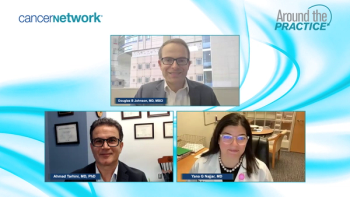
Panelists discuss how the treatment paradigm for melanoma has evolved to favor upfront dual checkpoint blockade over targeted therapy, except in specific cases where rapid response is needed for symptomatic patients with high LDH.

Your AI-Trained Oncology Knowledge Connection!


Panelists discuss how the treatment paradigm for melanoma has evolved to favor upfront dual checkpoint blockade over targeted therapy, except in specific cases where rapid response is needed for symptomatic patients with high LDH.

Panelists discuss how the combination immunotherapy approach is superior to monotherapy for most melanoma patients, with specific exceptions such as desmoplastic melanoma where monotherapy shows remarkably high response rates.

Panelists discuss how monotherapy may still be appropriate for certain patient populations including those with desmoplastic melanoma, solid organ transplants, severe autoimmune disease, and older patients where the toxicity risk of combination therapy may outweigh benefits.

Panelists discuss how 2 key clinical trials, Checkmate 067 and RELATIVITY-047, established the efficacy of different immunotherapy combinations while highlighting the significant difference in toxicity profiles between ipilimumab plus nivolumab (60% grade 3/4 toxicity) versus relatlimab plus nivolumab (19% grade 3/4 toxicity).

Panelists discuss how the toxicity profiles of immunotherapy regimens are fundamentally similar in type but differ significantly in frequency and severity, with ipilimumab-containing regimens causing higher rates of serious adverse events, particularly colitis and hypophysitis.

Panelists discuss how the dose-response relationship is more pronounced with ipilimumab than with PD-1 inhibitors, explaining why toxicity increases with higher ipilimumab doses while efficacy may not proportionally improve with higher PD-1 inhibitor doses.

Panelists discuss how treatment selection is personalized based on patient characteristics, with relatlimab-nivolumab or monotherapy preferred for frail patients with low disease burden, while ipilimumab-nivolumab might be considered for patients with brain metastases despite its higher toxicity.

Panelists discuss how community oncologists have developed good experience managing immune-related adverse events and are increasingly adopting relatlimab-nivolumab due to its lower toxicity profile and convenient administration schedule of half-hour infusions every four weeks.

Panelists discuss how sequencing immunotherapy combinations strategically can maximize patient outcomes, noting that ipilimumab-nivolumab may work well after progression on relatlimab-nivolumab (an approximately 27%-30% response rate), while the reverse sequence is less effective (an approximately 12% response rate).

Panelists discuss how emerging advances in melanoma treatment include next-generation tumor-infiltrating lymphocyte therapy, oncolytic immunotherapy, bispecific antibodies, cancer vaccines, and neoadjuvant approaches that may allow de-escalation of both surgery and systemic therapy while improving treatment-free survival.